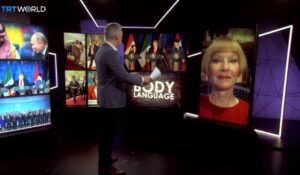 It was the last thing I expected.
It was the last thing I expected.
An email from the producer of TRT World’s Nexus online international news program. He asked if I would do a Skype interview analyzing the body language of world leaders at the G20 Summit.
I swallowed hard. My approach to body language is using it to determine how someone thinks: primarily visual, auditory or kinesthetic. And then use this to build rapport by presenting ideas in a way that appeals to her or him.
I’m not a “his arms are crossed and he’s leaning back, so he’s angry” kind of person, which is what I thought they wanted.
Reaction #1: Deflect
So I forwarded the email to another speaker I thought might be a better fit and asked if she was interested. Her answer was no.
Reaction #2: Decline
Then I called a trusted friend: life architect and executive coach Denise Hansard. I went through a litany of reasons why I was not a good fit for this and should say so.
After spewing that, I got to the truth: “I’m afraid. This is a little off-target for me, and I might say something stupid. Or wrong. Or look foolish. Or have the host make fun of me.”
I was ready to walk away because I might make a mistake.
Denise asked me one insightful question. “This is a chance to be on a world stage. What would you gain if you got it right?”
It’s true. I’d been so focused on the negative that I hadn’t considered the opportunity in this.
Reaction #3: Dive In
So I took a deep breath and replied that I’d do it.
The next day was spent trying to prepare. Watching lots of videos of world leaders to uncover what their bodies were saying.
At 4:30 the following morning, I wrote my goal: “Share useful information and have fun.”
This is the result. (My section begins with a fun video at about 17:18. If the graphic doesn’t connect you, here’s the link: https://www.youtube.com/watch?v=j98S8VFjhe0)
What I Learned
There are times when I should say no. There are other times when my fears would have me say no. I need to be more mindful of the difference. And be able to push myself when there’s something to be gained. And be willing to make—and choose to benefit from—mistakes.
And that’s not just for media interviews.
Do you need to prepare for an important interview or to be in the spotlight? Let’s talk!
